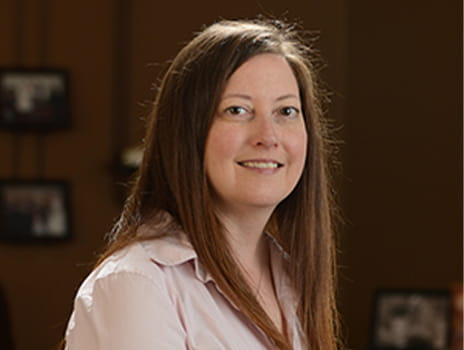Surviving and Thriving After Kidney Transplant


Complete care approach ensures triumph after polycystic kidney disease
To say a diagnosis of polycystic kidney disease (PKD) made someone feel empowered may seem hard to believe. But that's exactly how Jennifer Branch describes her mindset soon after a devastating PKD diagnosis in May 1996. According to Jennifer, once she understood her PKD diagnosis, she set her sights on the goal of receiving a kidney transplant. Once her kidney function fell to about 20%, which is required by transplant guidelines, she began the necessary tests and evaluations with doctors at The University of Kansas Health System.
Jennifer was officially placed on the transplant list in December 2013, and she prepared for the expected wait. Typical transplant wait time is often around 2½-3 years. But remarkably, Jennifer got a call after just 6½ months.
"When I received the call for my kidney transplant, I was very surprised," Jennifer says. "I didn't really understand what was happening at first, but I was very excited. I was quickly told about a donor offer, but I still thought they were talking about someone else. It didn't occur to me that this was a kidney for me. I was very blessed."
Jennifer received her kidney transplant on April 15, 2014.
"We help people with end-stage renal disease or pancreas failure through lifesaving transplants," says Jaime Bartley, nurse manager for the kidney and pancreas transplant program at The University of Kansas Health System. "Through the gift from another person, something so beautiful, we're able to help patients have a better quality of life and give them hope."
Bartley is part of a comprehensive team and approach to care that follows patients through their whole transplant journey. "This is the most dedicated, most experienced team that I've worked with," Bartley says. "They'll do whatever it takes to make the right decisions for the patient, each and every time."
Transplant surgeon Tim Schmitt, MD, director of transplantation at The University of Kansas Health System, reinforces the focus on complete care provided by the program – which offers nearly 50 years of experience performing transplants, as well as the highest volume of transplant procedures in the area.
"That requires us to have expertise, not only in surgery, but in all other aspects of taking care of the patient," Dr. Schmitt says. "Our system is comprehensive, with focus always on the patient. You don't need a referral from a doctor to be evaluated for transplant here at the hospital."

It's important for PKD patients and those exploring a transplant center to know what to look for in a provider and overall approach to care.
"There are many important factors to consider," says Dr. Schmitt. "One factor is outcomes. A record of good short- and long-term transplant outcomes is important. But also look at the center itself – the physicians, the care and how they focus on the patient. We can take patients from being very sick to living normally again. It's very rewarding to see."
Jennifer can't say enough about her experience with The University of Kansas Health System throughout her transplant journey.
"Ive been very blessed to have a really good team around me, including the surgeons and those who helped my family while I was there," she says. "And every time I go in for a follow-up, I've had wonderful care."
Now, Jennifer is living life fully post-transplant, and she wants to share her journey with others living with PKD.
"Today, I feel like I don't even have kidney disease or a transplant," she says. "I'm able to do everything I want to do – work, exercise, travel – everything I want or need to do. I want people to know they can live a very long, healthy life with kidney disease."
And at The University of Kansas Health System, Jennifer says, "You can work with people who are very caring, knowledgeable and invested in kidney disease and in helping people just like me."
We offer a variety of appointment types. Learn more or call 913-588-1227 to schedule now.
Not long ago, a diagnosis of polycystic kidney disease (PKD) felt bleak, to say the least. Caused by a common, potentially fatal genetic disorder, the condition has no cure, which can lead to chronic kidney disease or even kidney failure. But Jennifer Branch, a PKD survivor and kidney transplant recipient, has a message of hope for others facing a PKD diagnosis.
"I would tell others diagnosed with PKD that it’s definitely not a death sentence," Jennifer says. "There is a lot of education available, and treatment options, as well as many doctors and nurses who know a great deal about PKD."
She’s found such a team at The University of Kansas Health System to help her on her PKD healthcare journey.
"I was first established with a nephrologist there, and I’ve enrolled in PKD research studies," she says. "Participating in these studies makes me feel empowered."
Focused care and ongoing research
PKD strikes when individuals develop cysts in the kidneys, which multiply and eventually destroy and replace healthy kidney tissue. Nephrologist Franz Winklhofer, MD, at The University of Kansas Health System, works with many patients at all stages of kidney disease through the PKD clinic.
"We started the PKD clinic a few years ago with a broad group of clinicians, as well as scientists focusing their research interests on PKD," Dr. Winklhofer says. "Here, we can diagnose the disease, help interpret test results, provide expanded information about prognosis and, of course, focus on treating the disease as best we can."
The program includes a heavy emphasis on research and offers some patients the opportunity to engage in clinical trials. At this time, treatment for PKD is limited, so much of the clinic’s care emphasis addresses other risk factors that contribute to disease progression or kidney injury.
According to Dr. Winklhofer, the program at The University of Kansas Health System remains unique because of its dedicated focus on care and research for PKD.
"We have a wide range of diagnostic imaging to clarify the diagnosis in patients," he says. "Sometimes we see referred patients and discover the real diagnosis is actually something completely different."
He says the future for PKD treatment is bright, and the amount of research driving toward finding a cure for the disease is greater than ever. That’s good news for Jennifer and PKD patients like her.
Says Jennifer, “I feel like I’m at the best place I can be with PKD. I like to share my story, so other people know they can live a long, healthy life with kidney disease. At The University of Kansas Health System, you’ll find people who are very caring, knowledgeable and invested in treating kidney disease, and committed to helping people like me.”